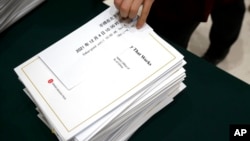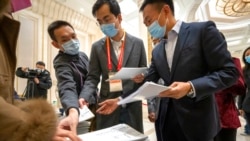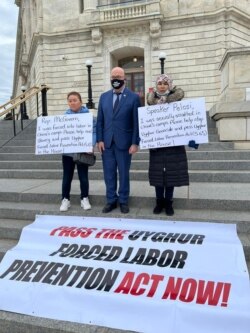U.S. efforts to counter what it sees as an erosion of democratic principles around the world are facing a new challenge from China, which is seeking to redefine the very word democracy and use it to describe its own one-party model of governance.
In a white paper issued days before U.S. President Joe Biden’s December 9-10 Summit for Democracy, Beijing’s State Council Information Office argues that its system — in which all power is firmly entrenched in the Chinese Communist Party — constitutes “a true democracy that works.”
U.S. analysts and political leaders are dismissing the claim, seeing it as a bid to make China’s diplomatic and economic outreach around the world more palatable to some of the countries where it seeks to invest and gain influence.
“In order to gain popularity and welcome, ultimately influence, in the international community, they decided to call themselves a democracy instead of changing practices to become one,” said Hu Ping, a onetime district councilor in Beijing who later edited China Spring and Beijing Spring, both U.S.-based journals focused on Chinese politics.
The release of the December 4 white paper, which was published in the China Daily, appears to have been timed to counter the Biden-hosted summit, which the U.S. State Department said was aimed principally at defending against authoritarianism, addressing and fighting corruption, and promoting respect for human rights.
The white paper offers a very different notion of what democracy is. “Whole-process people's democracy integrates process-oriented democracy with results-oriented democracy, procedural democracy with substantive democracy, direct democracy with indirect democracy, and people's democracy with the will of the state,” it says.
In a tacit acknowledgment that Beijing’s notion of democracy differs from what is more widely understood by the term, it said democracy “is a concrete phenomenon that is constantly evolving. Rooted in history, culture and tradition, it takes diverse forms and develops along the paths chosen by different peoples based on their exploration and innovation.”
Some elements of the treatise appear at odds with current practices in China, where President Xi Jinping is widely regarded as having set the stage this fall to remain in power indefinitely.
'Orderly,' lawful succession
“The best way to evaluate whether a country's political system is democratic and efficient is to observe whether the succession of its leaders is orderly and in line with the law,” the white paper said.
And at the very time that Chinese tennis star Peng Shuai had disappeared from public view after leveling a charge of sexual abuse against a former party leader, it listed another benchmark for measuring democracy as “whether the public can express their requirements without hindrance.” Peng has since denied making the accusation under what many suspect to be political pressure.
Other benchmarks for measuring democracy in the document appear to contrast with the ruling party’s growing efforts to control most aspects of daily life, ranging from popular entertainment to private tutoring. These include “whether the exercise of power can be kept under effective restraint and supervision” and “whether the exercise of power is genuinely subject to public scrutiny and checks.”
U.S. Representative Jim McGovern, a Democrat who chairs the powerful House Rules Committee and co-chairs the Congressional-Executive Commission on China, told VOA the version of democracy described in the white paper is very different from what is understood in most of the world.
“Democracy is a form of government in which the people have the ability to change their government through free and fair elections, a freedom that the citizens of the People’s Republic of China are denied,” McGovern said in a written statement to VOA.
“Genuine democracy requires respect for all human rights, including freedom of assembly, association and speech, as well as freedom from unwarranted governmental deprivation of the right to life and liberty, consent of the governed, and equal treatment before the law. None of these exist in China,” he said.
Attempt to shift focus
Jessica Ludwig, a senior program officer at the National Endowment for Democracy, sees the white paper as an effort to decouple the meaning of democracy from the principles described by McGovern.
“A closer look at the language Beijing uses to describe the concept of democracy — emphasizing democracy as ‘whole-process’ and arguing that different systems should be able to co-exist — reflect an effort to redefine democracy as a weaker, more malleable concept,” she said in written replies to questions from VOA.
Beijing, she said, is trying to “shift the focus of how democracy is defined into narrower terms of what a government delivers and how efficient its processes are rather than by the values it protects and the accountability of its institutions.”
Senator Marco Rubio, a member of the Republican Party and a senior member of the Senate Foreign Relations Committee, said China’s claim to be a democracy is contradicted by its treatment of its own people, including its crackdown on free speech in Hong Kong and its oppression of Tibetans and its Uyghur minority.
Known as one of the fiercest critics of Beijing, Rubio added that the Chinese Communist Party (CCP) “doesn’t have a shred of democratic legitimacy, no matter what they say.”
Shanghai-born historian Song Yongyi, who recently retired from California State University in Los Angeles, said in a phone interview that the CCP has claimed to be a champion of democracy since the 1940s, when the Mao Zedong-led party portrayed itself "as the true democratic force in China in order to get American support in the civil war” that ended with a communist victory in 1949.
Mao declared at that time that the political system run by the CCP was one of “people’s democratic dictatorship,” following the Leninist model, Song recalled.
Both Song and Hu believe the CCP knows as well as anyone what democracy means, then and now.
'Worse than Mao'
The fact that "they know they're not a democracy, and they know we know they're not a democracy, and they still insist on calling themselves a democracy," is consistent with increased confidence, or belligerence, on the part of the latest CCP leadership, Hu said.
“Back in the Mao era, Chinese leadership was very clear: we operate under a different model, and we’re in a battle against you,” Song said. He views the latest polemic as a bid to stress the democracy element while downplaying the dictatorship element of its governing model in order to better sell its policies to audiences at home and abroad and to undermine the Western concept of democracy.
“What they’re doing is worse than Mao,” he said, in that Mao was more honest about the true nature of the regime.
Editor's note: This article has been updated to correct Jessica Ludwig's position description at the National Endowment for Democracy.












